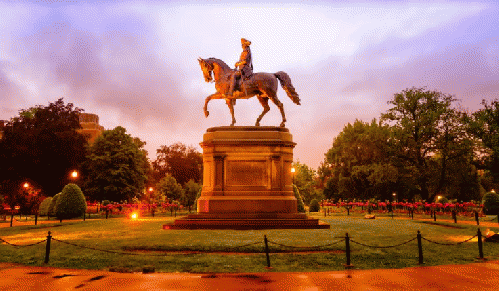The following excerpt from the 2013 book The Power of the Herd not only predicted the success of hyper-aggressive candidates like Donald Trump, it shows how our current political climate amplifies dysfunctional patterns established in the very first U.S. presidency.
Regardless of the lip service paid to democracy, our current system favors the most domineering, naturally predatory leaders who enjoy a good fight. But that's not even the bad news: Because of their compromised ability to feel fear, their lack of remorse for hurting others, stretching the truth or outright lying, and their marked gift for glib and entertaining putdowns, sociopaths are best suited to combating the personal effects of the relentless character assaults candidates endure---while using the same phenomenon to manipulate and intimidate others. It takes an almost supernatural level of courage and self-sacrifice for a compassionate person with vision and integrity to step into the fray. As a result, we don't need complex conspiracy theories to worry about selfish, dictatorial leaders taking power. Our intensely competitive culture selects for aggression and sociopathy.
Politics is the ultimate chamber of horrors in this regard. The debilitating effects of all the infighting, backbiting, sarcasm, and sheer mean-spirited vehemence our leaders endure---before and after election---prevent them from carrying out the simplest tasks. Yet the situation hasn't changed much in the last 230 years. In the 21st century, the same old interpersonal dramas, calculated deceptions, and capricious, hypercritical judgments the first U.S. President endured are just broadcast more widely and rapidly---set to music, with better visual aids.
Presidential Angst
Long after enemy forces surrendered and sailed back to England, President George Washington experienced vicious personal attacks and betrayals all the more shocking to him because they were carried out by fellow countrymen (some of who encouraged him to take office in the first place). The details are both fascinating and enlightening, especially concerning the creation of a two-party system that Washington abhorred. One example illustrates the now-classic pressures he faced.
In the mid-1790s, heated debates occurred over a treaty to continue trade with Great Britain after the Revolutionary War, an important income source for American merchants and farmers alike. Some people quite simply hated their former oppressors and wanted to cut all ties. Any attempt to form a post-war relationship, they argued, was a betrayal of the Revolution itself. Washington, however, supported negotiation, not only for economic reasons, but also as a way to keep tabs on an imperialistic regime that might someday strike again. (The War of 1812 proved him prescient on this account.) With compelling reasons, backed by an unusually effective leadership presence and, let's not forget, his hard-won reputation as the war hero who refused to be king, the President's opinion carried considerable weight. The Jay Treaty was passed. Detractors, still hoping to turn the tide, felt they had no choice but to launch a direct assault on Washington's character. This was hard to do without fudging the truth, spreading rumors, and whenever possible, gloating over any challenges the country faced rather than rallying behind the commander-in-chief to solve problems that might arise as a result of the admittedly imperfect trade agreement.
People who essentially liked Washington, yet disagreed unsuccessfully with key policies, began circulating rumors that billed him as a good-natured has-been, a naà �ve, senile old man who was clearly out of his league. Letters by Thomas Jefferson to this effect were "leaked" to sympathetic members of the press who didn't mind going public without revealing their sources, at least initially. Jefferson denied this covert betrayal for months, until one of his more offensive letters condemning Washington's leadership was actually printed in several newspapers, effectively ending all correspondence between the two former friends.
(Note: You can view every article as one long page if you sign up as an Advocate Member, or higher).





